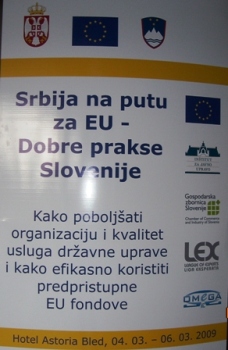SERBIA
ON THE WAY TO EU
09.03.2009.

`Serbia on the
way to EU – Good
Slovenian
practice`
is the title of
the seminar that
took place from
March 4 to March
6 in Bled,
Slovenia.
How to improve
the organization
and services
capacity of the
state government
and how to use
efficiently pre
-inaugural Eu
funds? The
answers to these
and many other
questions of the
realization of
the state
administration
reform second
phase of
Republic of
Serbia, the
group of
Slovenian
participants –
experts from the
sphere of
governmental
services, gave
the answers. The
representatives
of Serbian local
governments,
public
institutions and
communal
enterprises were
introduced with
the sublimated
models, concrete
principles and
practice of
establishing
efficient
administration,
including EU
standards,
together with
the Republic of
Slovenia
comparing
examples, as
well as current
models of EU
administration
work.
Slovenia
has significant
experience
deriving from
the very road
Serbia is going
along in this
moment-the road
to EU. In this
way Slovenia can
give to Serbia
bigger help than
other EU members
regarding this
matter, since
both countries
come from the
same legal
system which
only gives them
the opportunity
for better
cooperation on
the way to EU
– was emphasized
during this
seminar.
The seminar
programme was
attended by the
head of
administrations
of
municipalities:
Bojan Ilic,
Palilula
Municipality and
Novica Simic
Mediana
Municipality, as
well as PhD
Mile Ilic,
Nis City
Assembly
president, Dr
Nebojsa
Krstic, Nis
City Assembly
deputy of the
president and
Srdjan Jovanovic,
Nis City
Assembly deputy
secretary. The
experiences of
Slovenia in the
reform of public
sector were
pre-inaugural
points for
critically
created themes
selection of
this meeting.
The State, with
its public
sectors reforms,
initiates the
state
institutions to
become rational
and economic, to
guide their own
changes and
public services
quality. This
all has for its
immediate
consequence:
satisfied users,
secure
contribution to
economical
development and
life standard
quality. In the
period 2003-2008
Serbian
Government
enacted
`Strategy of
state government
reform` and many
other acts that
establish one
modern system of
the government
services and its
standardization
according to EU
regulations.
With this
seminar the
themes such as:
services
quality,
personnel
management,
professionalism,
processes
optimization,
associates
selection,
motivation of
the employed,
efficiency
estimation, the
system itself
-Institute for
public
governance,
Slovania,
Chamber of
commerce of
Slovenia,
European
commission in
Slovenia – LEH,
the league of
experts, Serbia
– Omega IC,
Slovenia and the
themes of E-
government and
data basis
digitalization,
as well as very
important
significant
theme –
identification
of the projects
of communal
infrastructure
and writing of
project
applications for
meeting criteria
for
infrastructure
financing from
pre-immanent EU
funds.
The work
methodology
during this
seminar was
based upon the
latest concepts
of knowledge
management in
session form,
interactive
lectures,
presentations,
panel
discussions, all
aiming at the
fact that the
seminar
participants
gain relevant
knowledge, high
level of usable
knowledge value
and the
possibility of
application in
their own
regions. The
speakers were
PhD Gregor
Virant (ex
minister of
economy of
Slovenia for
public
government and
the professor,
Faculty of Law,
Ljubljana;
Mihela Zupancic,
director of
European
Commission for
Slovenia office,
Matej Rogelj
from Chamber of
commerce of
Slovenia,
Boris Bregant
vice president
of Jesenica
Municipality,
Slavka Zupan
professional
manager `K and Z
agency` for
using European
resources.
The participants
of the seminar
from Serbia
visited the
Municipal
government of
Bled
Municipality,
governmental
unit of
Radovljica
Municipality and
one Austrian
Municipality –
Bilcovs
(multinational
municipality in
Austria) like
examples of good
practice in the
meaning of
public services
accessibility to
citizens and
efficient EU
funds using.
During this
seminar the
presence of EU
representatives
who represent
Slovenia in
European
parliament, as
well as the
representatives
of ministries,
local self
governments,
offices of
commerce and
craft chambers,
potential
investors for
Serbia was
provided. That
was the
possibility for
immediate and
close
communication,
experience
exchange,
establishing
partnerships and
future
cooperation with
these Slovenian
institutions.